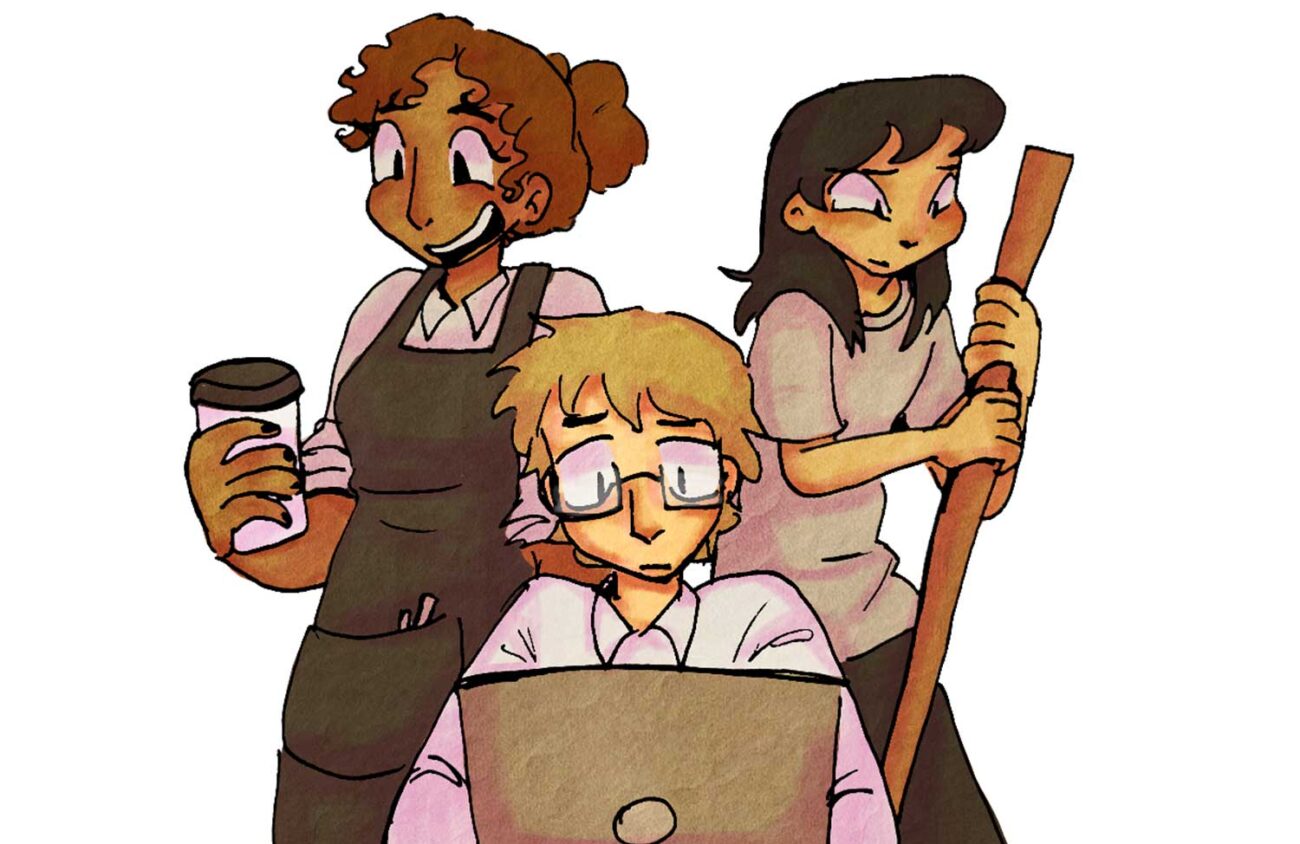The University of Oregon Student Workers union interim president is currently looking for a new position at the university. Mae Bracelin says, “That does make me the third out of four campus labor union presidents to get my job cut, which is strange and suspicious.”
Last spring term, the UOSW was the first campus-wide undergraduate student union in the country to win a collective bargaining agreement, in which students gained the right to arbitrate and grieve instances of harassment and discrimination, as well as modest pay increases.
Despite these wins, three weeks before the start of the fall term, many student workers received notices of job cuts or the university deciding not to reappoint them, encouraging students who are eligible for work study to apply. The job cuts came shortly after UO announced a $25 million budget deficit.
Work study is a federally funded financial aid program. Bracelin says the university started prioritizing work study students over student workers, even when the student worker has more experience.
According to Bracelin, student workers are being drastically cut or completely removed from dining halls and places like the Knight Library, and Central Kitchen, a food preparation facility that distributes meals and packages goods for dining halls, as well as catering events. For dining workers who have been reappointed, issues with shift availability have conflicted with their schedule, causing them to be unable to work.
“There was just this really powerful sense of community that was developed on our picket line, and it was heartbreaking to see that community get pulled apart by the cuts,” Bracelin says.
Bracelin has been working with the student union on this campaign since it originally went public in 2021, her freshman year. Now, going into her senior year, Bracelin says she is still fighting for a fair economic restructure after being let go from the Global Scholars Hall dining staff this summer.
She was one of over 50 dining workers who weren’t reappointed this term, leaving many scrambling to find jobs to pay for not only groceries and rent, but the cost of a school year that’s already started.
The UO denied Eugene Weekly’s interview request, but Angela Seydel, UO spokesperson and director of Issues Management, provided a statement. “Student employment numbers fluctuate depending on the changing needs and budgets of different hiring departments throughout the university,” she writes. “After going through the budget reduction process, various units around campus may reduce the number of student worker positions they hire this year or may have delayed hiring positions.”
Seydel writes that 50 student positions were ended in June, as their contract was not continued into the fall term. She adds that one department in the library has changed its position to work study preferred, and that reappointments have historically varied.
“Some departments posted hiring notices for similar numbers of student positions as they have in the past. We don’t yet have concrete data comparing this year’s hiring to last year,” Seydel writes.
Bella Hoffert-Hay, a reappointed Global Scholars Hall dining worker, says that GSH has consistently had over 100 staff members for the past three years she has worked there. She says as of a month ago, they laid off more than 70 workers, leaving GSH with 36 student workers, which she says the university claims is its fully functioning staff.
When staff were let go, they were notified via identical emails claiming performance inadequacies led to each cut, without listing specifics. Hoffert-Hay says, “It was pretty dehumanizing to receive the exact same email as like 70 other people, and that’s just in your workplace.”
As the UOSW’s Weingarten representative, Hoffert-Hay serves as a third party during investigative or disciplinary meetings to ensure fair conduct. In these meetings, students are allowed to defend or explain their shortcomings after their mistakes are clearly broken down by an advisor. She says, “With all the non-reappointments, it was sort of a way, as we see it, to circumnavigate that and completely just get rid of people without any sort of due process.”
In addition to cutting student workers, academic programs are being reduced, with departments like Judaic and Middle Eastern studies being impacted. According to a UOSW press release, United Academics faculty labor union intervention prevented complete department cuts.
Kate Mills, UA president and associate professor of psychology, says, “I’m really concerned that the administration hasn’t thought through how employment is so important for many of our students to be here on campus to be at the UO, and I’m worried about the impact of students losing their employment and then having to drop out of school.”
She says, “If they’re losing their employment, and they need the employment to be here, that creates an access issue, especially for residents and also non-resident students, furthering inequities and who can access education.”
Bracelin says these cuts will result in an imbalance of teachers to students as the university continuously cuts the workers who make the university operate. She says everyone — faculty, student workers, grad workers, classified employees — will feel these cuts.
“We also hope to work with the rest of campus labor,” she says, “to pursue a fair economic restructure, because we don’t believe that this proposed budget, and this proposed economic restructure of our university, is a fair one.”
Bracelin adds, “Karl Scholz makes nearly a million dollars a year, and there’s no projected cuts to upper administration’s budget.”
A Note From the Publisher

Dear Readers,
The last two years have been some of the hardest in Eugene Weekly’s 43 years. There were moments when keeping the paper alive felt uncertain. And yet, here we are — still publishing, still investigating, still showing up every week.
That’s because of you!
Not just because of financial support (though that matters enormously), but because of the emails, notes, conversations, encouragement and ideas you shared along the way. You reminded us why this paper exists and who it’s for.
Listening to readers has always been at the heart of Eugene Weekly. This year, that meant launching our popular weekly Activist Alert column, after many of you told us there was no single, reliable place to find information about rallies, meetings and ways to get involved. You asked. We responded.
We’ve also continued to deepen the coverage that sets Eugene Weekly apart, including our in-depth reporting on local real estate development through Bricks & Mortar — digging into what’s being built, who’s behind it and how those decisions shape our community.
And, of course, we’ve continued to bring you the stories and features many of you depend on: investigations and local government reporting, arts and culture coverage, sudoku and crossword puzzles, Savage Love, and our extensive community events calendar. We feature award-winning stories by University of Oregon student reporters getting real world journalism experience. All free. In print and online.
None of this happens by accident. It happens because readers step up and say: this matters.
As we head into a new year, please consider supporting Eugene Weekly if you’re able. Every dollar helps keep us digging, questioning, celebrating — and yes, occasionally annoying exactly the right people. We consider that a public service.
Thank you for standing with us!

Publisher
Eugene Weekly
P.S. If you’d like to talk about supporting EW, I’d love to hear from you!
jody@eugeneweekly.com
(541) 484-0519
